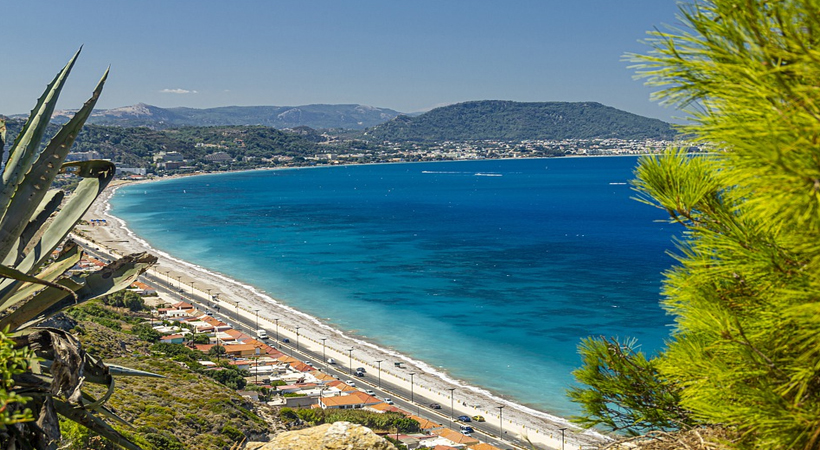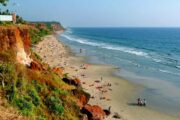Greece vs Portugal: Battle of the beaches

They’ve both got beaches, food, history and sunshine, but two leading tourist destinations are now selling themselves as Europe’s safest as they try to lure the visitors they need to prop up economies fried by the coronavirus.
Both Portugal and Greece, which this week opened their doors wider to international visitors, are trumpeting relatively low infection rates and widespread measures to keep the virus in check.
And both face financial peril unless they can persuade the tourists to come, CNN says in a detailed report.
Portuguese Prime Minister António Costa believes his country remains as attractive as ever, but has launched a new campaign highlighting its safety. “All the reasons to visit Portugal are still here so tourists are welcome,” he tells CNN.
Portugal has one of Europe’s lowest death tolls from Covid-19 — 1,520 fatalities among a population of fewer than 11 million — and the government hopes its handling of the pandemic will help the country beat out other nations as it tries to convince would-be travelers to visit.
“We are among the countries that tested the most, we’re one of the countries that better knows the real spread of the virus, where the numbers are the safest and where people can come with confidence,” Costa says proudly. “Confidence will be one of the differentiating factors at the moment of choosing where to go on holidays — I think that Portugal is a good destination.”
His comments are mirrored by his counterpart in Greece, Kyriakos Mitsotakis, who says his country’s top priority is safety as this week it opens seasonal hotels to visitors from across Europe.
“I am not interested in making Greece the number one destination in Europe,” Mitsotakis says. “I am interested in making Greece the safest destination in Europe.”
In Portugal, part of the efforts to build up that confidence has been the introduction of hygiene certification to designate tourist facilities as “clean and safe.”
“We’ve created a protocol between the health authorities, all the hotels, to create a special seal, clean and safe, to give everyone guarantees so that they can come and they’ll be safe,” Costa says. Some 14,000 businesses have received the seal and 15,000 employees have been trained, officials say.
Lisbon’s old town neighborhood of Alfama — usually packed with tourists on a sunny day — is still quiet. The area, vacated by many residents over the past decade due to the gentrification that saw many buildings turned into tourist accommodation, is only just beginning to open up restaurants, shops and cafes closed during the height of the virus, says CNN.
A survey by Hotelaria de Portugal, an association that represents 65% of hotels in the country, does show that people are indeed planning their holidays in Portugal but optimism levels do not match those of the prime minister Costa.
Most bookings come from Spain (20.7%), the United Kingdom (16.8%), France (14.7%), and Germany (9.4%), according to the study, which also showed that most of the hotels surveyed still expect to have an occupancy rate below 20% until the end of the year.
Because of that, a majority of hotels will only be operating at full capacity from September and a large portion will have to remain at a reduced capacity until the end of the year. It’s a grim outlook, especially for a country where tourism alone represents 14.6% of GDP, says CNN.
“Until there’s a vaccine there’ll be a virus,” Prime Minister Costa says. “Initially we only had one way of protecting ourselves — it was to lock ourselves at home — now we know more and we know how to live with the virus in safety.
It’s a similar picture in Greece where about 90% of tourism revenue comes from international visitors. The country will be lucky to see anywhere near the 33 million visitors, bringing an estimated $20 billion, that it received in 2019.
But while beautiful shorelines like rugged Porto Katsiki on the Ionian island of Lefkas — regularly featured on global best beaches lists — are currently crowd-free, they’re expected to get busier as Greece begins the gradual opening of its borders.
With considerably fewer virus fatalities than Portugal, Greece is being hailed as one of the safest countries for holidaymakers in the Mediterranean this summer. It’s seen under 200 deaths from Covid-19 and a little over 3,000 cases in a population of 11 million.
Greece hopes its early success in the fight against the virus will translate into receipts, in an industry that accounts for more than 20% of the country’s GDP and one in four jobs.
As in Portugal, strict health and safety protocols have been introduced. Hotels are required to have a contracted physician on call while employees must have to take regular tests.
At popular destinations “Covid-19 rooms,” or in some cases designated hotels, have been set aside to quarantine anyone testing positive for the virus.
Hoteliers in Lefkas say the vast majority of questions from potential clients are about health and safety.
“People want to travel but they want to make sure they minimize exposure. They want to know that once they arrive at their final destination they will have space to social distance and feel safe,” says Odysseas Christofides, owner of the Pavezzo Country Retreat.
Christofides estimates bookings to have dropped by 60% since this time last year. “We also have a lot of guests with valid bookings who don’t know if they will need to cancel last minute because of travel restrictions and uncertainty about flights. It is a one step at a time year for all of us.”
North of Lefkas, in the resort town of Parga the beach has just been cleaned and sunbeds put in place. Parga receives tens of thousands of visitors annually, mostly from Europe’s north. This year it started out completely empty for the first time since the hotels were first built in the 1950s, locals say. With preparations visibly underway, they express concern about the summer ahead.
With annual visitor numbers more than doubling since 2010 and increasing reliance on the tourism industry, Greece knows that despite its early success the country’s economy is going to suffer. The government has said that more than half of this year’s tourism revenue is already lost, CNN adds.
Tourism has only just managed to help Greece begin to emerge from a 10-year financial crisis, but it now looks as if that same industry’s woes will now send the country’s economy spiralling downward again.
To try to bolster the sector, Greece’s government has presented an extensive plan including an improved health infrastructure.
This includes the installation of nearly 450 beds for Covid-19 cases on popular islands and the hiring of nearly 700 additional staff. Eleven airplanes have also been transformed into futuristic-looking “transit capsules” that can be used for patients needing to be airlifted to intensive care units, says the CNN report.
With many challenges still ahead, Greece’s Prime Minister Kyriakos Mitsotakis says the coming months will be “a different summer.”
His Portuguese counterpart, António Costa, is in agreement.
“We will have to live with the virus for a very long time,” he says. “Does that transform our lives? Yes. Does that impede our lives? No. It requires us to live differently.”




